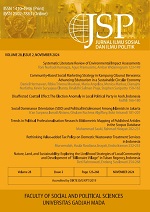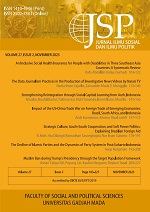Behind OPEC’s Invitation for Indonesia to Rejoin: An Analysis of Membership Dynamics in an International Organization
Novita Putri Rudiany(1*), Indra Kusumawardhana(2)
(1) Department of International Relations, Faculty of Communication and Diplomacy, Universitas Pertamina, Jakarta, Indonesia
(2) Department of International Relations, Universitas Pertamina, Jakarta, Indonesia
(*) Corresponding Author
Abstract
The membership structure matters to ensure a durable negotiating forum in an international organization. However, in July 2017, Saudi Arabia and the United Arab Emirates, on behalf of the Organization of the Petroleum Exporting Countries (OPEC), requested Indonesia to reactivate its membership, which the country had suspended—for the second time—in November 2016. The first suspension was in January 2009—annulled in January 2016. The Government of Indonesia (GoI) then welcomed the invitation. This study aims to analyze OPEC’s membership scheme, which has given leeway to its members to send a request like the above. In-depth interviews were conducted with Indonesia’s representatives in OPEC to capture the organization’s internal condition. By analyzing the organization’s membership dynamics, we can identify three reasons behind Indonesia’s invitation to rejoin. The first is because OPEC’s country members need Indonesia’s presence in negotiations as they consider Indonesia neutral. Second, OPEC needs a country with a different attribute to strengthen the organization’s image of diversity on the international stage. The third reason is the historical elements. OPEC strives to maintain historically good relations with the GoI as the country has contributed to the organization’s development. For those reasons, an international organization might reinvite its former member to join the group.
Keywords
Full Text:
PDFReferences
Al-Yousef, N. (1998). Economic Models of OPEC Behaviour and the Role of Saudi Arabia. June.
Barnett, M., & Duval, R. (2019). International Organizations and the Diffusion of Power. In R. Weiss, Thomas; Wilkinsonn (Ed.), International Organization and Global Governanace 2nd Edition (2nd ed., pp. 51–62). Routledge.
Brendt, K. (2015). And Then There Were 13: Indonesia Rejoins OPEC. The Diplomat. https://thediplomat.com/2015/12/and- then-there-were-13-indonesia-rejoins- opec/
Cuervo, L. E., He, I. I. N. T., & Of, I. M. (2008). OPEC FROM MYTH TO REALIT Y. December 2006, 433–615.
Droesse, G. (2020). Membership in International Organization: Paradigms of Membership Structures, Legal Implication of Membership and the Concept of International Organization. Asser Press. https://link.springer.com/ chapter/10.1007/978-94-6265-327-6_5
esdm.go.id. (2017). Beberapa Negara Anggota OPEC Meminta Agar Indonesia Kembali Bergabung di OPEC. Kementerian Energi Dan Sumber Daya Mineral Republik Indonesia. https://www.esdm.go.id/ id/media-center/arsip-berita/beberapa- negara-anggota-opec-meminta-agar- indonesia-kembali-bergabung-di-opec
Felor, E. (2017). OPEC and Its Role in Regulating Price of Petroleum OPEC and Its Role in Regulating Price of Petroleum (No. 80156; Issue 80156). https://mpra.ub.uni-muenchen.de/80156/1/MPRA_ paper_80156.pdf
Gray, J., Lindstädt, R., & Slapin, J. B. (2017). The Dynamics of Enlargement in International Organizations. International Interactions, 43(4), 619–642. https://doi.org/10.1080/03050629.2017.1228039
Jensen, S. (2017). Indonesia-UAE Relations in the Context of Regional Governance. Asian Journal of Middle Eastern and Islamic Studies, 11(4), 100–111. https://doi.org/10.1080/25765949.2017.12023320
KemendagRI. (2018). Export Growth (HS 6 Digits Period: 2013-2018). https://statistik. kemendag.go.id/export-growth-hs-6- digits
Koremenos, B., Lipson, C., & Snidal, D. (2003). The rational design of international institutions. The Rational Design of International Institutions , 55(4), 1–363. https://doi.org/10.1017/CBO9780511512209
Lamont, C. (2015). Research Methods in Politics and International Relations (p. 238).
Lawler, A. (2015). Indonesia’s Return to OPEC Complicates Decision on Output Target. Reuters. https://www.reuters. com/article/opec-oil-indonesia- idINL5N1221K820151011
Magliveras, K. D. (2011). Membership in International Organization. In J. Klabbers & Å. Wallendahl (Eds.), Research Handbook on the Law of International Organizations (pp. 1–530). https://doi. org/10.4337/9780857931290
Nazari, M., Asadi, E., & Imanian, M. (2019). Uncertainty, Budget Deficit and Economic Growth in OPEC Member Countries. Energy Sources, Part A: Recovery, Utilization, and Environmental Effects, 1–11. https://doi. org/https://doi.org/10.1080/15567036.2019.1668510
Negara, S. D. (2017). The Impact of Saudi King’s Visit to Indonesia. ISEAS-Yusof Ishak Institute, 16, 1–11.
NewYorkTimes. (1992). Ecuador Set to Leave OPEC. The New York Times. https://web. archive.org/web/20160314210526/http:// www.nytimes.com/1992/09/18/business/ ecuador-set-to-leave-opec.html
Nitisastro, W. (2011). The Indonesian Development Experience: A Collection of Writing and Speeches of Widjojo Nitisastro. ISEAS Publishing.
Noguera, J., & Pecchecnino, R. A. (2007). OPEC and the international oil market: Can a cartel fuel the engine of economic development? International Journal of Industrial Organization, 25(1), 187–199. ht tps:/ / doi.org/ 10.1016/ j.ijindorg.2006.04.010
Oil&GasJournal. (1995). Gabon Protests OPEC Fee; Withdrawal Reported. Oil & Gas Journal. https://www.ogj.com/home/ article/17216979/gabon-protests-opec-fee- withdrawal-reported
OPEC. (2010). OPEC Bulletin March 2010. OPEC. https://www.opec.org/opec_web/ static_files_project/media/downloads/ publications/OB032010.pdf
OPEC Statute, (2012).
Quandt, W. (1982). Saudi Arabia’s Oil Policy. The Brooking Institution.
Rahman, M. (2014). Dari Penelitian ke Korporasi dan Diplomasi Energi. Badan Litbang ESDM.
Rahman, M. (2020). Indonesia in OPEC.
Sands, P., & Klein, P. (2009). Bowett’s Law of International Institution, 5th edn. weet & Maxwell. https://www.cambridge. org/core/journals/international-and- comparative-law-quarterly/article/abs/ bowetts-law-of-international-institutions-5th-edn-by-philippe-sands-and-pierre- klein-london-sweet-maxwell-2001-xxxv-610-pp-3000/1B9967351DCAEDA4A -1C1512EC67B38C
Setkab.go.id. (2016). Indonesia Decides to Suspend its OPEC Membership. Office of Assistant Deputy to Cabinet Secretary for State. https://setkab.go.id/en/indonesia-decides-to-suspend-its-opec-membership/
Sommerer, T., & Tallberg, J. (2017). Decision- Making in International Organizations: Actors, Preferences, and Institutions. SSRN Electronic Journal, 1–44. https://doi.org/10.2139/ssrn.3059444
Sundaryani, F. (2016). Indonesia Backs Out of OPEC Amid Production Cur. The Jakarta Post. https://www.thejakartapost.com/ news/2016/12/02/ri-backs-out-of-opec- amid-production-cut.html
TheJakartaPost. (2017). Saudi Arabia Confirms Investment in Cilacap Refinery: Minister. The Jakarta Post. https://www.thejakartapost. com/ news/ 2017/ 02/ 28/ saudi-arabia- confirms-investment-in-cilacap-refinery- minister.html.
U.S. EIA. (2015). Country analysis executive summary: Inonesia. In U.S. Energy Information Administration, Independent Statistic & Analysis. https://www.eia.gov/ international/analysis/country/IDN
Van De Graaf, T. (2017). Is OPEC Dead? Oil Exporters, the Paris Agreement and the Transition to a Post-Carbon World. Energy Research & Social Science, 23(September ), 182–188. https://doi.org/http://dx.doi.org/10.1016/j.erss.2016.10.005
Voeten, E. (2014). Does participat ion in international organizations increase cooperation? Review of International Organizations, 9(3), 285–308. https://doi.org/10.1007/s11558-013-9176-y
Young, O. R. (1991). Political leadership and regime formation: On the development of institutions in international society. International Organization, 45(3), 281–308. https://doi.org/10.1017/S0020818300033117
Yusgiantoro, P. (2020). Indonesia in OPEC.
Article Metrics
Refbacks
- There are currently no refbacks.
Copyright (c) 2023 Jurnal Ilmu Sosial dan Ilmu Politik

This work is licensed under a Creative Commons Attribution-NonCommercial-NoDerivatives 4.0 International License.























